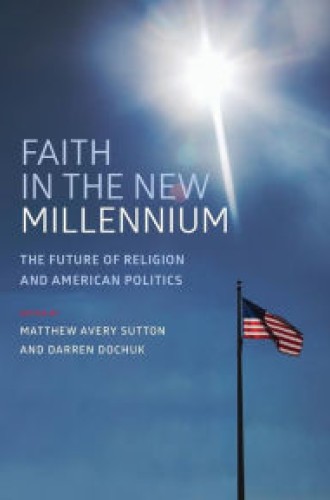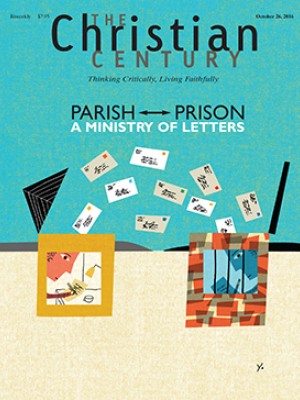Political religion, sanctified politics
It's odd the way this volume deals with Barack Obama. It's a shame it has to deal with David Barton at all.
I suspect that the one of the few tasks more difficult than reviewing a book of essays by disparate scholars is assembling such a collection in the first place. In the case of this volume, that challenge was compounded by the fact that its organizing principle was not so much a conference (although one took place) as the shared affiliation of most of the contributors with the Young Scholars in American Religion Program at the Center for the Study of Religion and American Culture at Indiana University–Purdue University Indianapolis. This remarkable program has groomed promising scholars in the field, and some of their work is on display here—although I confess that, as a historian, I’m always a tad chary about books with “future” in the title.
If such a volume is to succeed, it must be anchored by strong essays by established scholars, the academic equivalent of ringers. The editors, Darren Dochuk and Matthew Avery Sutton, more than amply fill that role, complemented by such luminaries as Edward J. Blum and Jennifer Graber—all historians, by the way. Some of the contributions are reworkings of previous scholarship (Sutton’s study of apocalypticism, for instance), and others provide a glimpse into work in progress (such as Dochuk’s examination of the relationship between religion and the oil industry).
Read our latest issue or browse back issues.
One of the names invoked in several essays is David Barton, the faux historian who has fashioned a career out of manufacturing and propagating quotations from the nation’s founders that “prove” that the United States is and always was a Christian nation. It’s unfortunate that responsible scholars have to expend any energy whatsoever to refute such nonsense, but the cult of Christian nationalism is one of the many historical fantasies that the religious right has unleashed on the American public.
Kate Carté Engel, who studies the era of the founders, takes on these distortions, arguing that the perpetuation of this myth in certain circles is itself a form of religious ritual. Mark Chancey’s essay about the follies of the Texas State Board of Education illustrates the mischief that Barton and his fabrications have caused in public education.
Several chapters deal with the rise of the nones in recent years, a phenomenon attributable to several factors, not least the crass politicization of religion since the late 1970s. Anthea Butler examines the quandary of African-American conservatives in coming to terms with a pro-choice president who supports same-sex marriage, and Arlene Sánchez-Walsh finds that “Latino/a evangelicals have a higher proportion of anti-immigrant attitudes than Latino/a Catholics and mainline Protestants.” Charles F. Irons compares John F. Kennedy’s speech to the Greater Houston Ministerial Association in 1960 with Mitt Romney’s address about his faith at Texas A&M University 47 years later, although he fails to note that whereas Kennedy affirmed the First Amendment and the separation of church and state, Romney, looking ahead to the 2008 Iowa precinct caucuses, refused to do so.
One of the more fascinating essays, “The Welfare of Faith,” by Alison Collis Greene, delves into a chapter of American religious history that is only now beginning to attract the attention it merits: the Great Depression. Greene examines the transition of poor relief from the churches to the government in the throes of the Depression and concludes that “when the money ran out, churches turned their spending inward, not outward.”
A volume of essays this size is bound to include a clunker, and this one comes from an unlikely source, a scholar from Cambridge University. Andrew Preston pontificates on the role of religion in shaping the foreign policies of various presidents. He anoints Ronald Reagan and George W. Bush “holy warriors,” despite the latter’s utter disregard for more than a millennium of “just war” thinking. Preston declares, on the other hand, that Jimmy Carter “deliberately sidelined religion from foreign policy making.”
I claim no expertise on foreign affairs, but I do know a bit about Carter, and to assert that religion had no effect on his policies suggests either delusion or willful distortion. On his first day in office, Carter informed his vice president, Walter Mondale, of his intention to pursue peace in the Middle East, a place the president regarded as the “holy land.” As Lawrence Wright demonstrates in Thirteen Days in September, Carter all but staked his presidency on the Camp David peace talks because of the region’s religious significance. Similarly, Carter’s religious scruples impelled him to renegotiate the Panama Canal treaties, and his speech at Notre Dame just weeks into his presidency heralded a shift in American foreign policy away from the reflexive dualism of the cold war toward an emphasis on human rights. You can argue that the shift was premature (and the Soviet invasion of Afghanistan provides heft to that argument), but Preston’s assertion that religion played no role in Carter’s foreign policy at the very least calls his other judgments into question.
A recurring character in this volume, not surprisingly, is Barack Obama. What I find fascinating is that the authors don’t seem to know what to do with him. He is variously portrayed as an avatar of the evangelical left, a mainline Protestant, a “Protestant secularist,” someone of “uncertain religious pedigree,” a “deliberate and reflective” Christian, and a heedless secularist. Sometimes these multiple and conflicting characterizations appear in the same essays.
This apparent confusion, I suspect, has less to do with the president himself than with the dangers of presentism. This makes Amanda Porterfield’s cautionary note in the volume’s afterword all the more germane. “Careful study of American history is indispensable,” she writes. “Contexts are vital because, as historical situations change, the meanings of religious terms and the implications of political decisions change as well.”
With regard to the president, at least, perhaps we should wait until we are deeper in the new millennium to render judgments.







